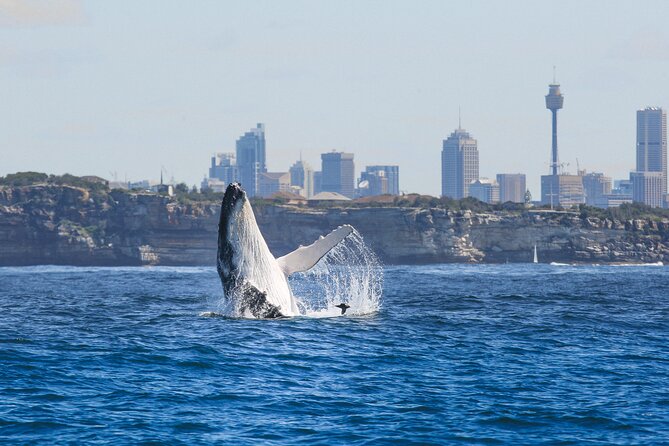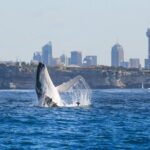
28 Aug Funded Whale of a PhD opportunity
Funded PhD Opportunity:
Australia-based, whale watching & ecocultural/environmental communication
Interested candidates should send required materials before 8 September 2025 for best consideration. This call will remain open until the position is filled.
Overview description:
This is an opportunity to pursue a funded PhD in Sydney, Australia, under the supervision of Professor of Environment & Society Tema Milstein as part of a research project titled “Environmental Communication for Whales, Dolphins, and Restorative Futures.” The project aims to uncover the ecocultural discourse dimensions of globally popular whale and dolphin watching to advance effective strategies for sustainability awareness both in Australia and internationally. As the PhD student associated with this Australian Research Council (ARC) funded project, you will do ecocultural discourse research primarily around whale watching in Sydney,actively contribute to the ARC research project as a whole, and develop your own thesis/dissertation aligned with the project.
Who should apply:
This one-time individual opportunity is open to domestic (Australia) and international students. Candidates interested in pursuing their PhDs who meet the criteria below, as well as current PhD students who meet the criteria and are interested in shifting to continue and complete their PhD at University of New South Wales (UNSW) with this project, are encouraged to apply. If the selected candidate is international, they will need to take steps to rapidly secure a student visa so they can be in Australia at the project’s commencement (currently scheduled for 1 January 2026 but could be as late as 12 March 2026).
What the experience will be like:
As the project’s PhD student, you will receive training and mentorship and contribute collaboratively to support and develop project research activities, including literature reviews, land- and boat-based field data collection, analysis, write-up, and enhancing the quality of the project’s academic, public, industry, and policy impacts and outcomes. You will be full-time (35 hours/week) in this role. With your time, you also will research and write your thesis relating to the project. The successful applicant will be welcomed into a small cohort of PhD students supervised/advised by Prof. Milstein, all passionate about ecocultural transformation, and join a supportive Environment & Society Group in the School of Humanities & Languages at UNSW (consistently ranked in the world’s top 20 universities). PhD programs in Australia do not require coursework (though PhD students can freely audit courses) nor do they attach teaching duties to one’s stipend/scholarship (though PhD students can seek opportunity to do paid teaching or marking/grading). Instead, as a PhD student, you can commit your entire PhD journey to research. You will live in Sydney, one of our planet’s top quality-of-life cities – a diverse, safe, and beautiful coastal urban environment, surrounded by national parks and visited 6 months of the year by migrating humpback whales.
Duration & funding:
This is a fully funded scholarship (AUD$39,206 per annum, 2026 rate) plus tuition fees waived. The PhD is 4 years duration, contingent on start date, satisfactory progress, and successfully completing the PhD on time (due to ARC funding source, this full-time PhD will need to be started and completed within the 4-year timespan of the ARC Future Fellowship).
Selection Criteria: If you meet the following criteria, you are encouraged to apply.
Applicants must:
· have completed with excellent marks a relevant masters by research/with thesis, strong honours, and/or equivalent research work,
· demonstrate ability to undertake high quality qualitative academic research (examples include previous research projects, conference presentations, and/or publications).
· have knowledge of and strong interest in ecocultural/environmental communication research and methodologies,
· have knowledge of and strong interest in ecocultural discourse, identity, and transformative praxis research
· demonstrate commitment to proactively keep up to date across relevant transdisciplinary knowledges and developments
· Be a lateral and prismatic thinker with demonstrated ability to focus intensively on a long-term project
· be a self-directed learner with demonstrated ability to take mentorship
· be responsible, highly organised, and detail oriented
· be collegial, kind, collaborative, and flexible
· be enthusiastic, motivated, and demonstrate a genuine passion for the research
· demonstrate professionalism and ability to communicate and interact with a diverse range of study participants on land and water
· have excellent English language skills
Ideal candidates also will have:
· strong experience in participant observation, field-based research, ethnography, interviewing
· strong experience in critical-cultural and positive discourse analysis methodologies
· strong experience creating literature reviews
· cetacean (whale and dolphin) and related ecological interest and knowledge
To be considered for this PhD position, email the below materials directly to Prof. Tema Milstein. Applications received before 8 Sept will receive best consideration, but the call will stay open until the position is filled. If, upon review of your materials, you are shortlisted, we will contact your recommenders and you will be invited to interview with Prof. Milstein. The top selected candidate will proceed to a rapid university-level application for the position.
Send the following materials to Prof. Milstein, tema.milstein@unsw.edu.au, with subject line “Whale of a PhD:”
Interest Statement – in 500 to maximum 1,000 words, describe:
1. how you see yourself aligning with and supporting Prof. Milstein’s “Environmental Communication for Whales, Dolphins, and Restorative Futures” research project. (If you would like to see a detailed description of the research project, feel free to email your request to Prof. Milstein.)
2. how you match the selection criteria (please show, don’t tell, by providing examples)
3. initial ideas you have for your thesis that could emerge parallel with the larger research project.
In addition, include the following:
1. Your current CV, including a list of any research presentations and/or publications (with live url links, if available).
2. Your academic transcripts, including your marks/grades, for all undergraduate and postgraduate/graduate awards/degrees
3. One solo-authored written research sample
4. Three recommenders who agree to be contacted: Include names, titles, institutions, direct email addresses, and direct phone numbers. At least two should be academics. Include letters of recommendation, if readily available.
PhD start date pending: Currently 1 January 2026 but potentially as late as 12 March 2026
See UNSW posted ad: https://www.unsw.edu.au/research/hdr/our-projects/funded-PhD-opportunity-australia-based-whale-watching




Sorry, the comment form is closed at this time.